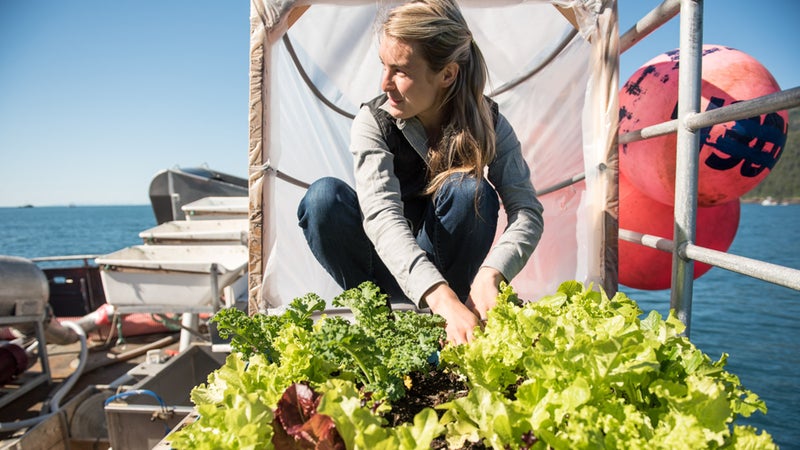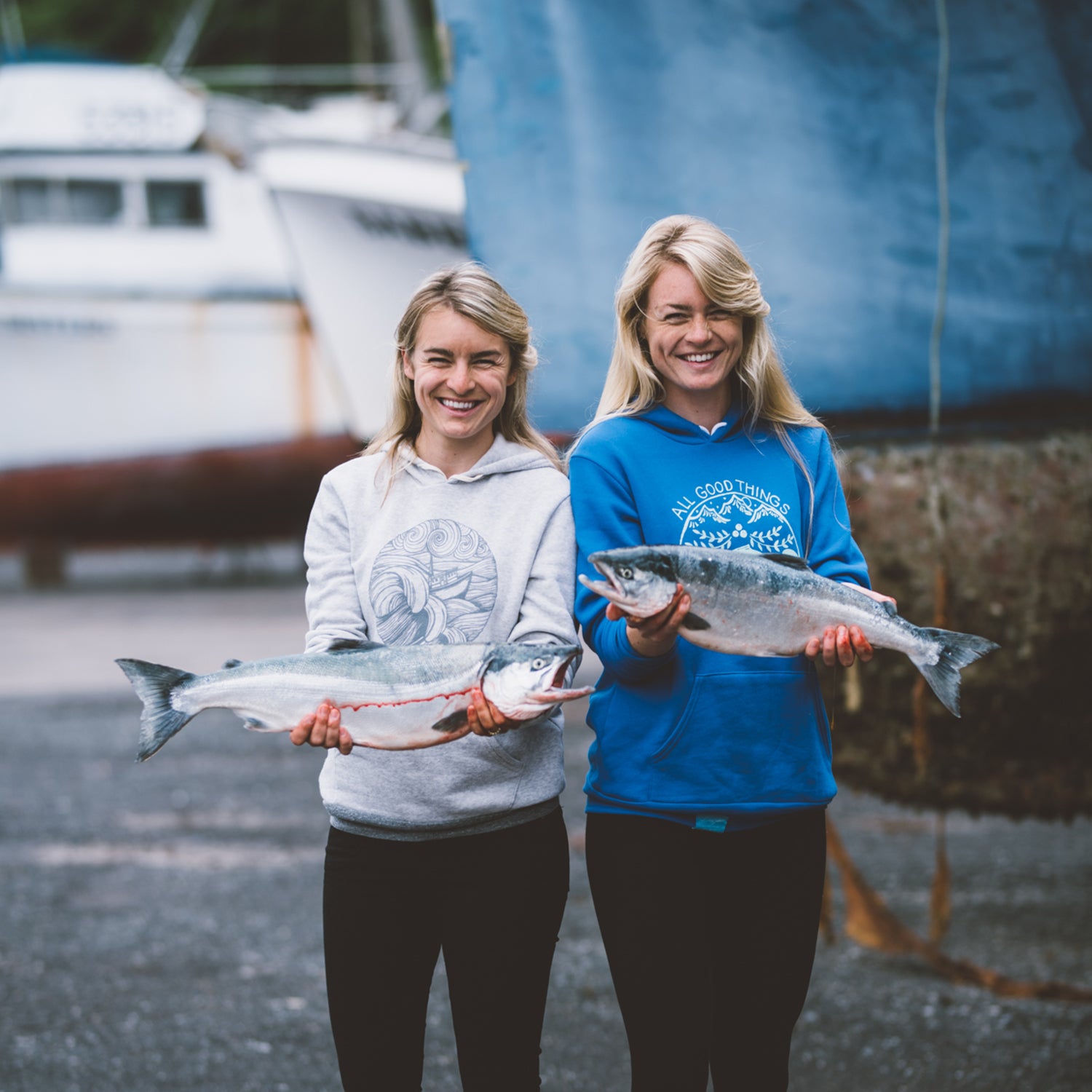Sisters Emma Teal Laukitis and Claire Neaton were baiting fishing lines at the time most girls their age were going to soccer camp or ballet recitals. They were born into a commercial fishing family in Alaska and spent summers aboard their family’s commercial boat, fishing for salmon in Prince William Sound and for halibut in the Aleutians. Both went off to college but couldn’t resist the call of the sea. “We feel most at home in wild places,” says Claire. “My dream was to sell seafood, but I realized no job was going to let me take five months off to go commercial fishing.” The sisters decided to return home to Alaska after graduating to continue working on a boat. During the long winter off-season, however, they needed something to occupy their time. Emma learned how to screen print while attending art school in Italy and started selling shirts and bags with ocean-inspired designs on Etsy. “Young fishermen in our Alaskan community were excited to have something to wear that represented their livelihood,” she says.
Encouraged by the positive feedback, the women formed in 2012. The brand now sells nautical-inspired apparel and housewares, ranging from fish-patterned boots to T-shirts sporting the mantra “Know Your Fisherman.” They also flash-freeze and ship more than 2,000 pounds of wild halibut, sablefish, Pacific cod, and salmon throughout the United States. This summer, the sisters opened a Homer, Alaska–based flagship shop in a shipping container that, no surprise, once transported fish, and they took their seafood on the road to remote Alaskan communities via a mobile pop-up shop. “We’re so crazy fortunate this little Alaskan community raised us,” says Claire. “Salmon Sisters is our opportunity to give back.”

Ages: Claire, 27, and Emma, 26
Job: Commercial fisherwomen and business owners
Home Base: Claire: Homer, Alaska; Emma: Seattle, Washington
Education: Claire studied business and nutrition at the University of Vermont; Emma studied English and art at Williams College and is currently pursuing a masters in design at the University of Washington.
On Growing Up Off the Grid
Emma: “We grew up on a homestead in the Aleutian Islands of Alaska. It ran on alternative energy, and we grew all of our own food. Claire and I would bounce between the garden and Dad’s boat. We’d be gathering firewood for the smokehouse, farming food, digging clams in the tide pools. By middle school, we were working on the boat. Life was simple but good, and early on we learned to work hard.”
On the Qualifications Needed to Work on a Boat
Emma: “There’s no manual or test to pass to work on a fishing boat. Captains will hire a green crew. It’s the crew’s responsibility to teach each other. You have to be able to tie certain knots and dock the boat, but all those things you can learn on the fly, and then you do them ten times. It’s a lifelong learning process.”
Claire: “If you want to get into commercial fishing, involve yourself in a coastal community. Find a mentor. You might start in a fish processing plant or at a commercial fishing lodge or on a charter boat. The key is to familiarize yourself with the people and place.”
On Their Daily Rituals
Emma: “Fishing is a very repetitive job. I wake up and check the marine forecast every morning to be one step ahead of the weather. We take our rain gear on and off at least three times a day. Food prep is a huge part of each day. The crew spends a lot of time thinking about what we can cook. Halibut tacos are always a hit, and the Crock-Pot is a staple.”
Claire: “When I get up, I always make sure our funky little coffeepot is going. The boat consumes a lot of coffee.”
On Embracing Discomfort
Emma: “Sometimes people get shaken up by things they can’t control, and at sea, it’s hard to control most things. If you’re a person who likes to know exactly what’s going to happen, this isn’t the job for you. You need to be tough to the core and flexible.”
On One Thing They Can’t Live Without
Claire: “ are a godsend. You are always covered in salty sea spray, sweat, fish blood, jellyfish goo. We keep communal bottles of and sunscreen onboard.”
Emma: “I always bring a full iPod of music. Podcasts are key for sanity.”
What People Don’t Understand About the Job
Emma: “The land hustle. When you aren’t fishing, you’re advocating for your fishery—going to meetings, writing letters—just to make sure your job is there in the future.”
Claire: “You cannot be complacent. It takes an army—mechanics, net vendors, processors—to have your boat and equipment functioning and efficient.”
On the Importance of Having a Side Hustle
Claire: “Commercial fishing can be extremely lucrative, or you can totally strike out. The people who make it work create a lifestyle to deal with those fluctuations. They might captain on one operation and crew on another. You have to be able to live in the present rather than stress about the future.”
Emma: “Last year, we had one of the worst salmon seasons in our fishery in a long time. It was really hard on people, especially those trying to make payments on their boat. You have to save your money, anticipating that every year won’t be a good year. If you don’t, you can end up in a troublesome spot. You have to diversify, fishing in different areas or fishing for different things. For Claire and me, Salmon Sisters was our way of diversifying.”
On the Sea-to-Table Dilemma
Claire: “The lack of labeling and transparency is a huge problem and challenge. We fish for pink salmon and, on average, get 30 cents a pound for it. It’s sad to think our product is valued in cents, not even dollars. I wish we could have a beautiful fish market and traceable seafood. If people knew the characters catching their seafood, they’d see it as an artisanal product, not a commodity.”
On Their Success
Claire: “We never expected Salmon Sisters to take off like it did, but I think Alaskans are looking for a connection to the land and ocean. They wear Salmon Sisters like a badge as if to say, ‘We believe in these things, too.’”


